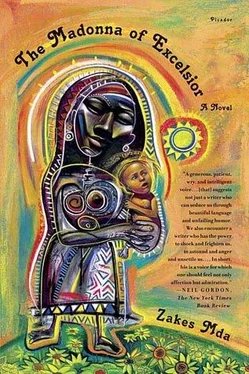“It was for the good of everyone,” screamed Adam de Vries. “Things just went wrong. But there was never any intention to hurt anyone. All we wanted to do was to guide the black man to civilisation.”
“Which is what you continue to do today, hey?” said Viliki sarcastically. “With your Excelsior Development Trust. Guide the natives to civilisation.”
“One can never win with you, Viliki,” said an exasperated Adam de Vries. “If we fold our arms and do nothing, you still blame us. You must admit it, Viliki. You need us. A black man’s way of thinking is that he cannot create a job for himself. He wants the white man to guide him. Or even create a job for him.”
Such debates always ended in deadlock. Viliki would walk away from Adam de Vries’s office fuming and vowing that he would never visit the stubborn old codger again. But of course the next time he was in Excelsior, he would go to Adam de Vries’s office again.
On the road with the Seller of Songs, Viliki admitted something he would never admit in the presence of Adam de Vries or any white man of Excelsior, lest it reinforce their I-told-you-so attitude. He told the Seller of Songs — who had very little recollection of the days of apartheid because she had been too young then — that those had been very bad days because people were oppressed.
“But at least Excelsior was clean,” he added. “Mahlatswetsa was clean. Gardens were neat. The town council even gave a prize for the best garden.”
We had heard this gripe about the lack of cleanliness before. It used to be Viliki’s daily song even before he took to the road with the Seller of Songs: that we didn’t care about beautiful gardens any more.
“Today people don’t care,” he lamented. “They are now free. Tall grass grows in front of their houses. They expect the government to come and clean their gardens for them. Why else did they fight for freedom if the government they elected will not remove the grass in front of their houses? People are free. They must enjoy their freedom. They must sit on their stoops all day long and the government must feed them. During the days of apartheid, they used to go out and look for work. Now they are free. The government must feed them. If Mahlatswetsa Location is filthy, it is the fault of the government. The government must clean Mahlatswetsa Location. Is that what freedom means to us?”
We observed that Viliki could afford to be critical now that he was no longer a town councillor. Didn’t the dirt begin during his tenure as mayor? Those days, of course, his garden used to be one of the very few that were clean and beautiful, with lilies of different types. Now he no longer had the right to pontificate about gardens because his own garden was as ugly as the rest. It had fallen into neglect since he took to the road.
Adam de Vries did not give up on Viliki. He knew that next time he came to Excelsior, Viliki would visit his office, and the old lawyer would try once more to convince him to stay and join the Excelsior Development Trust. He was proud of its achievements. It had established a mentoring programme that he hoped would change the face of agriculture in the eastern Free State. Under the auspices of this organisation, Adam de Vries had recruited a number of Afrikaner farmers to support emerging black farmers. He had even been able to convince Johannes Smit to join the programme and mentor some emerging farmers.
Like Tjaart Cronje, Johannes Smit still believed that the Afrikaners had been lied to by their leaders, who had assured the volk that they would not just hand over the government to the blacks without making certain that the Afrikaners would continue to wield their rightful power. Unlike Tjaart Cronje, Johannes Smit was resigned to the fact that the Afrikaners had been deceived and therefore had to make the best of the situation. After all, there were some benefits in getting into partnership with black farmers. Some affirmative action contracts and tenders would surely come his way, in the name of his protégés.
Tjaart Cronje was in his butchery when he first heard of Johannes Smit’s treachery. He was no longer a town councillor, as he had not stood in the local elections. He had decided to leave politics to the blacks, who would doubtlessly ruin the town and the rest of the country, making it possible for the Afrikaner to regain his power.
“Did you hear about Johannes?” asked Jacomina, as she rushed into the butchery from the bank.
“What about Johannes?”
“He has joined Oom Adam in the Excelsior Development Trust.”
“No. not Johannes Smit. he can’t do that,” said Tjaart Cronje, shaking all over with anger.
“Maybe you should reconsider your stand too, Tjaart,” advised Jacomina. “Maybe it is better for all of us to be part of this new South Africa.”
But Tjaart Cronje was no longer listening. He was ranting about the betrayal of the elders. He was raving that he had fought wars oh behalf of Adam de Vries, whose generation had never died at the border nor faced petrol bombs in the black townships. And now he had made an about-turn, taking many good Afrikaners with him. He would remain true to Afrikaner values even if everyone left to join the enemy camp. He was prepared to fight a lonely war.
It was clear that Tjaart Cronje had altogether lost control. He was screaming at the top of his voice, wielding a cleaver. His workers cowered in the corner. But he made no attempt to attack them. He was only interested in chopping the air in front of him. Jacomina stayed out of range while at the same time pleading with him to calm down.
“What do you expect from a man who ate pap and morogo in the huts of black nannies and boasts about it?” screamed Tjaart Cronje.
“You are not well, Tjaart,” pleaded Jacomina. “You have been working too hard. Let me drive you home. You need a rest.”
He seemed to calm down, and placed the cleaver on the counter. Jacomina rushed to him and embraced him.
“Don’t you worry, my darling,” she said, “everything will be all right.”
“Okay, many an Afrikaner child has played with black piccaninnies and has eaten in their homes,” he said weakly. “I myself used to play with Viliki. I had a bite or two at Viliki’s home. But it is not something I boast about at a dinner table. It was just part of the reality of growing up in the Free State platteland. Something better forgotten than broadcast at a dinner table!”
Then he began to jabber and foam at the mouth. He was running a temperature. Jacomina phoned Cornelia Cronje, and then drove her husband to the doctor.
ASPAN OF four donkeys is pulling a cart across the emerald-green ground. A green man and a green woman sit on the cart. A big round red sun burns in the red sky. Flashes of green and white cloud float around the sun. Green hills appear on the expansive horizon. The tones are hot and sombre.
The rays of the summer sun seared through the corrugated-iron roof and through the white ceiling. They filled the room with unbearable heat. The whirling fan on the ceiling was fighting a losing battle. It stirred the hot air that was descending with a vengeance over Tjaart Cronje as he lay on a white metal bed. His gaunt body was covered only in a white sheet, which was already drenched with his sweat. He was fast asleep. A group of elders in black suits stood over the bed, looking at him sadly. Among them were Klein-Jan Lombard, Gys Uys, Adam de Vries and the Reverend François Bornman. Klein-Jan Lombard was now retired from the police service and was dabbling in vegetable farming on his smallholding. The one-time mayor of Excelsior in the good old days, Gys Uys, was the oldest of the elders.
The elders were solemn. And respectable. None of them looked like men who would not acknowledge their daughters.
Читать дальше












